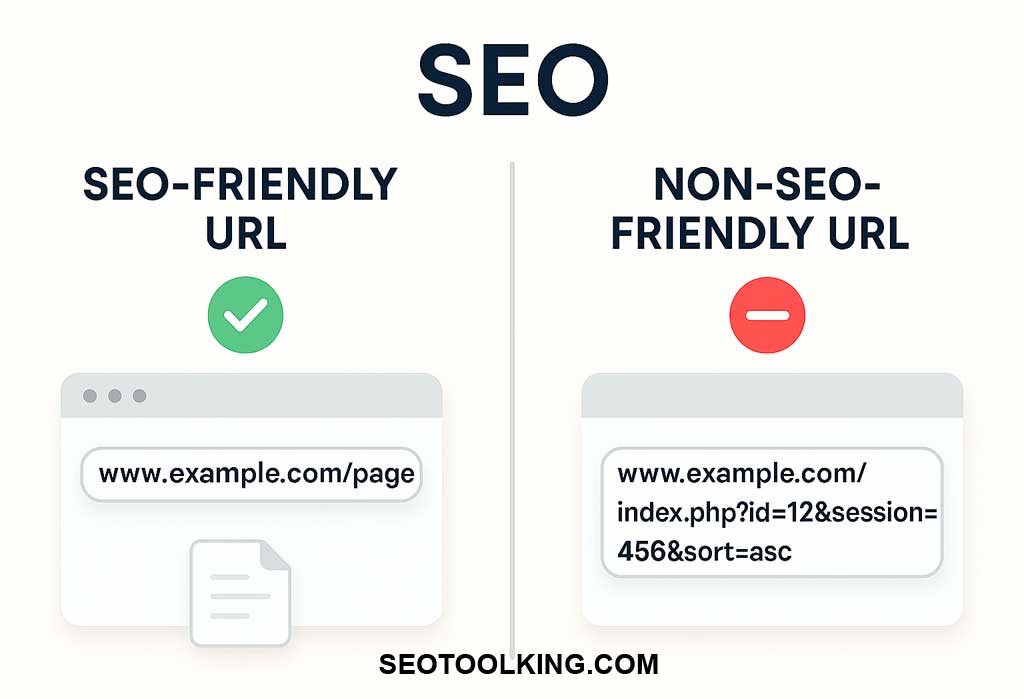SEO URL Structure Guide – Mastering in SEO-Friendly URLs
When it comes to SEO optimization, many website owners focus on content, backlinks, and meta tags, but they overlook a critical factor: URL structure.
A clean, keyword-rich, and properly optimized URL can:
- Improve Google rankings
- Increase CTR (Click-Through Rate) in SERPs
- Enhance user experience
- Prevent duplicate content issues
In this comprehensive course explore everything you need to know about SEO URL structure, from the basics to advanced strategies.
You will Learn
- What is SEO-Friendly URL Structure?
- Why URL Structure Matters for Google SEO
- Best URL Structure for SEO in 2025
- How to Create SEO-Friendly URLs for Blogs
- SEO URL Length – How Long Should a URL Be?
- Using Keywords in URLs for Better Rankings
- Hyphens vs Underscores – Which is Best for SEO URLs?
- Static vs Dynamic URLs – Which is Better for SEO?
- Subdomains vs Subdirectories for SEO
- HTTPS and Secure URLs for Better Rankings
- Canonical URLs – Preventing Duplicate Content in SEO
- Common Mistakes in URL Structure and How to Fix Them
- How to Optimize E-commerce URLs for SEO
- Local SEO URL Structure Best Practices
- International SEO – Multilingual and Hreflang URLs
- Mobile SEO and AMP URL Considerations
- Case Studies: Websites That Improved Rankings with URL Optimization
- Advanced URL Structure Tips for Technical SEO
- Using Redirects (301, 302) Without Hurting SEO
- Tools for Checking and Optimizing URL Structure
- SEO-Friendly URL Checklist
What is SEO-Friendly URL Structure?
An SEO-friendly URL is short, descriptive, keyword-rich, and easy for both users and search engines to understand.
Bad Example:
www.example.com/index.php?id_wd=57&cat=products
Good Example:
www.example.com/seo/url-structure-guide/
Why URL Structure Matters for Google SEO
Google has confirmed that URLs are a ranking factor. A clean structure helps:
- Improve crawling & indexing
- Provide context to search engines
- Build trust with users
Run an SEO Audit to check if your URLs are optimized for Google.
Best URL Structure for SEO in 2025
- Keep it short & simple
- Use primary keywords
- Separate words with hyphens (-)
- Use lowercase letters
- Avoid stop words like “and”, “the”, “of”
How to Create SEO-Friendly URLs for Blogs
- Include the focus keyword in the slug.
- Avoid dates in URLs (makes content look outdated).
- Example:
www.example.com/seo-url-structure/
Optimize content titles with our Meta Tag Generator.
SEO URL Length – How Long Should a URL Be?
- Ideal: 50–60 characters.
- Shorter URLs rank better because they’re easier to read & share.
Using Keywords in URLs for Better Rankings
✅ Always include primary keyword.
✅ Use long-tail keywords for specific pages.
Example:
www.example.com/best-url-structure-for-seo/

Hyphens vs Underscores – Which is Best?
- Hyphens (-): Recommended by Google.
- Underscores (_): Google treats them as one word.
Static vs Dynamic URLs
- Static URLs: Fixed, keyword-friendly (✅ best for SEO).
- Dynamic URLs: Auto-generated, may include parameters (?id=, ?sort=).
Use URL rewriting to turn dynamic into static.
Subdomains vs Subdirectories for SEO
- Subdirectories (
example.com/blog/) → Better SEO signals. - Subdomains (
blog.example.com) → Treated as separate sites.
HTTPS and Secure URLs
Google uses HTTPS as a ranking signal. Always secure URLs with SSL.
Canonical URLs
Prevent duplicate content by specifying the preferred version.
Example:
<link rel="canonical" href="https://www.example.com/seo-url-structure/">
Common Mistakes in URL Structure
❌ Using uppercase letters.
❌ Long, keyword-stuffed slugs.
❌ Forgetting redirects when changing URLs.
E-commerce URL Optimization
- Keep product URLs clean:
/category/product-name/
- Avoid filter parameters in crawlable URLs.
Local SEO URL Structure
Use location-based keywords:
/plumbing-services/new-york/
International SEO
Use hreflang tags and country code TLDs:
example.co.uk
example.fr
Mobile SEO and AMP URLs
Google recommends responsive URLs. Avoid separate “m.” sites.
Case Studies
- E-commerce brand shortened 120-char URLs → 40% traffic boost.
- Blog removed dates from slugs → improved CTR & freshness.
Advanced URL Structure Tips
- Use breadcrumbs in URLs.
- Avoid deep nesting (>3 levels).
- Use 301 redirects when updating URLs.
Redirects (301 vs 302)
- 301 Redirect (Permanent): Passes ~90% link equity.
- 302 Redirect (Temporary): Use for short-term moves.
Tools for URL Optimization
seo url structure, best url structure for seo, seo friendly urls, optimize urls for google, keyword in urls, url length seo, canonical url, dynamic vs static urls, permalink structure
SEO-Friendly URL Checklist
✅ Short & simple
✅ Keyword-rich
✅ Hyphen-separated
✅ Lowercase
✅ Canonical tags used
✅ HTTPS enabled
FAQ
Q1: Does URL length affect SEO?
Yes, shorter URLs perform better.
Q2: Can I change old URLs for SEO?
Yes, but always use 301 redirects.
Q3: Should I put keywords in URLs?
Yes, it improves relevance and CTR.
Q4: What’s better, subdomains or folders?
Subdirectories are generally better for SEO.
Q5: Do capital letters in URLs hurt SEO?
Yes, they can cause duplicate versions.
Conclusion & Next Steps
Optimizing your URL structure is one of the easiest yet most powerful SEO tactics.
👉 Use these free tools from Small-SEO-Tool.com:
With the right strategy, your URLs can drive higher rankings, better CTR, and long-term SEO success.


